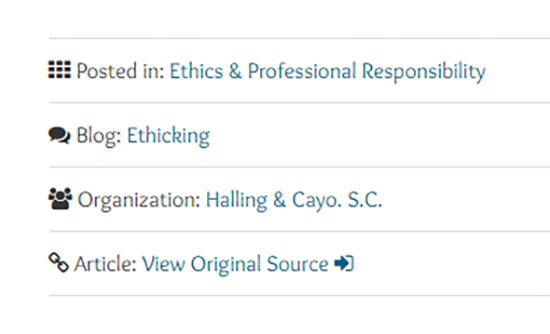
Aug. 3, 2022 – According to legal blogger Emily Kelchen, blogging is a critical tool for lawyers looking to shape their reputations and attract clients.
“There’s going to be information about you on the internet whether you put stuff out or not, so why not put stuff out that you want to people to read and know about you?” Kelchen said.
“You might as well be the one feeding the information. The more you do that and the more consistently you do that, the higher you’re going to get in the search results and that’s going to be a great client generator for you.”
The lawyers who make up
WisLawNOW, an online law blogging community that debuted in 2020, have heard the message loud and clear.
Almost 2,000 Posts
In 2021, WisLawNOW bloggers posted 1,986 articles. So far this year, WisLawNOW bloggers have posted 1,584 articles. For the fiscal year ending June 30, 2022, WisLawNOW blog posts received 98,538 page views.
From big firm lawyers to solo practitioners, WisLawNOW bloggers are providing a steady stream of rich content. Last year’s posts touched on topics ranging from ethical issues in alternative dispute resolution, family law discovery tools, and recreational immunity for landowners.
State Bar members can visit
WisLawNOW and read content published by Wisconsin law bloggers on a daily basis. WisLawNOW curates member-generated content on a single website that allows readers to easily find blogs and subscribe to them, and offers bloggers a way to reach more readers and boost their visibility.
The site is easy to navigate and offers search tools to help find posts on specific topics. Twice a month, members receive an email digest highlighting the best content featured on WisLawNOW.
Full-time Blogger
For Kelchen, legal blogging has become a full-time job. Kelchen, a member of the State Bar of Wisconsin’s Nonresident Lawyers Division, took up legal blogging in 2012, after she moved to New Jersey.
“I wasn’t barred there yet and I was looking for something to do to make a little money while I was waiting to get barred,” Kelchen said. “I ran across a company that does websites for attorneys and they were looking for a content writer, and I said ‘Yeah, I can do that.’”
Kelchen said a good blog can function like a recommendation from a family member or a positive Google review. The key to making a good blog, she said, is regular posting and writing keyed to a lay audience.
“The key is consistency, not frequency,” Kelchen said. “If you can consistently do one a month, that’s better than nothing. If it’s a priority and you really need client generation, one a week is really where you need to be.”
Content Guidelines

According to legal blogger Emily Kelchen, blogging is a critical tool for lawyers looking to shape their reputations and attract clients.
To write an effective blog post, Kelchen said, lawyers should keep their audience in mind.
“Most legal writing you’re writing for the court or an opposing party – a sophisticated legal audience,” Kelchen said. “When you’re writing a blog post, you’re writing for clients – people who need help and are looking for information. You need to write for those people.”
But to avoid creating an attorney-client relationship with readers, lawyers must be careful to not provide legal advice in a blog post, Kelchen said. The key is to showcase your experience at a more general level.
“You should present yourself as a knowledgeable person who can help [readers] resolve their issues,” Kelchen said.
Think Like an Angler
Like a well-tended garden, a good legal blog can bear substantial fruit.
“The way to rise to the top of your results pages is to consistently put out information that talks about what you do, so that when people are searching for someone like you they find you,” Kelchen said.
Kelchen recommends that lawyers write blog posts aimed at the types of clients they’d like to attract, much like an angler selects the bait or lure appropriate to the species of fish she’s hoping to catch.
Ideally, Kelchen said, blogging functions as a complement rather than a replacement for in-person marketing. That way, Kelchen said, the people you meet at a Rotary Club meeting or a golf outing “go home and google you to check you out, and you want to reinforce that you’re a credible, knowledgeable, responsible attorney. That’s where your internet results come in.”
History Lessons and Practice Tools
WisLawNOW helps extend the reach of blogs and creates a digital library of member-generated content that readers can consume on a daily basis.
WisLawNOW is one of multiple communication platforms available to State Bar members. The State Bar offers other writing opportunities for members, including
Wisconsin Lawyer™,Inside Track™, a bi-monthly electronic newsletter, and
State Bar section blogs.
Not all legal blogs exist to drive website traffic. Some offer history lessons or serve as resources for specific practice areas.
The
Lavinia Goodell: Wisconsin’s First Woman Lawyer blog, also on WisLawNOW, is an example of the former.
On Point, a blog maintained by the State Public Defender (SPD), is an example of the latter.
Colleen Ball, an SPD appellate lawyer, has written for both blogs.
Along with Wisconsin Supreme Court Commissioner Nancy Kopp, Ball started the Lavinia Goodell blog in 2019. The idea for the blog came to Ball when she was cleaning out a closet and came across materials for a research project that her daughter had done on Goodell a decade or more earlier. Ball ended up writing for the blog for about a year-and-a-half.
Resource for Defense Bar

“The goal was to keep the defense bar aware of development in caselaw on issues that affect our clients,” says Colleen Ball, an SPD appellate lawyer. She writes for
On Point.
These days, Ball writes for
On Point, along with her fellow public defenders Jefren Olsen and Andy Hinkel. She helped start the blog in 2010 with public defender Bill Tyroler, who’s since retired.
The blog grew out of case updates that Tyroler emailed to an ever-growing list of lawyers.
“The goal was to keep the defense bar aware of development in caselaw on issues that affect our clients.”
Over time, Ball said, the blog has become a tool for tracking changes in the law and become a resource for both criminal defense lawyers and judges.
“Some decisions really make it possible for you to go back and look at how the law has just changed in that decision, even if that wasn’t the court’s intention,” Ball said. “And to also highlight where, frankly, they’re contradicting themselves or maybe where they’ve made a statement that seems inaccurate.”
The blog’s list of subscribers, which numbers about 2,000, isn’t limited to criminal defense lawyers – it includes judges and legislators, Ball said.
“We hope that judges are reading it and we hope that legislators are reading it, in order to influence them,” Ball said. “It’s a way for legislators in particular to realize that the law’s just taken another step.”
Ball said that prosecutors subscribe to the blog too. And earlier this year, she said, she was contacted by several police departments asking how their members could subscribe.
‘Snappy Writing’
Ball said she and her SPD colleagues typically limit blog posts to between 700 and 800 words – about the length of a newspaper editorial.
 Jeff M. Brown is a legal writer for the State Bar of Wisconsin, Madison. He can be reached by email or by phone at (608) 250-6126.
Jeff M. Brown is a legal writer for the State Bar of Wisconsin, Madison. He can be reached by email or by phone at (608) 250-6126.
She recommends that bloggers aim for “snappy writing, catchy headings, and short posts with timely and pertinent information.”
Ball said that contributing to On Point has made her a better lawyer.
“You’re reading so many cases that you otherwise wouldn’t,” Ball said. “If I were just an appellate lawyer, I would be researching each one of those.
“Here, I must read very widely, so you have both a broader understanding of the law and a deeper understanding because if you’re going to try and explain a case in 700 or 800 words, you have to poke into the brief a little bit to try and say something interesting about it. It makes us better appellate lawyers.”
Top 12 Legal Blogs on WisLawNOW
By number of posts 7/1/2021 to 7/1/2022
Top State Bar Section & Division Blogs
By number of posts 7/1/2021 to 7/1/2022
Other Legal Blogs on WisLawNOW
Other Wisconsin Law Blogs*
* Blog affiliated with a law firm with less than 20 attorneys. At least 12 posts in 2021 and at least five posts in 2022. If the blog does not have an actual name, the law firm name is used.
** These are “independent” blogs. They are not affiliated or branded by a law firm. However, this list still notes the law firm or entity of the independent blogger listed.
Wisconsin Large Firm Blogs*
* More than 20 or more lawyers. At least 12 posts in 2021 and at least four posts in 2022. Some larger firms maintain multiple blogs. They are not listed separately. If the blog does not have an actual name, only the law firm name is noted.
Wisconsin Academic Law Blogs
WisLawNOW Brings Together Wisconsin’s Community of Legal Bloggers

WisLawNOW brings together blog content written by State Bar of Wisconsin members under a single website.
This network is developed in partnership with LexBlog, a legal blogging network of more than 25,000 bloggers nationwide.
Many Wisconsin legal bloggers have already joined this legal blogging community to expand their reach, showcase their expertise, and contribute to this digital collection of legal information in many practice areas.
Why WisLawNOW?
1.
Creates community of Wisconsin legal bloggers that readers can access in one place.
2.
Improves member access to a growing, timely library of legal knowledge that is searchable and responsive to mobile devices. And, members can find or subscribe to content of specific interest through practice-area channels.
3.
Uses technology to expedite information delivery and extend the reach of member-generated content, potentially leading to lawyer-to-lawyer and consumer referrals.
No Cost to Join WisLawNOW
WisLawNOW is a benefit of State Bar membership. Legal bloggers who join WisLawNOW continue to publish on their regular platforms, and RSS technology will automatically pull their blog posts into the WisLawNOW website.
The blog author’s law firm and profile are highlighted in the post, linking back to the original blog post. See an example below.
See entire blog post.

Blog posts must meet the
Blog Post Inclusion Criteria. WisLawNOW will feature blogs related to the practice of law, including substantive legal developments, analysis of legislation or regulatory change, practice management and technology issues, lawyer ethics, lawyer well-being, and other topics that relate to the work of Wisconsin lawyers.
To increase readership of this blog content, the State Bar distributes an email digest to members every other week to showcase the best of this content.
This email means greater distribution of your blog post. In essence, WisLawNOW allows Wisconsin legal bloggers to amplify their message, creates a community of legal bloggers, and allows readers to access all Wisconsin legal blogs in one place.
The State Bar is continually onboarding member-bloggers. To be included in WisLawNOW, members must complete a
short online form.
After filling out the form, the blog will be reviewed for substance and technical requirements. For more information, read WisLawNOW’s
FAQ.
Join now
